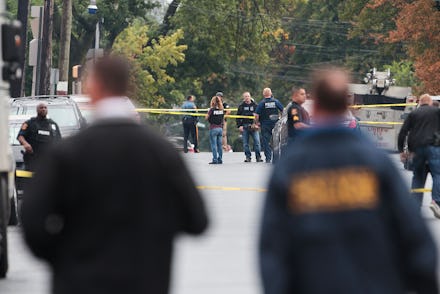Reaction to Ahmad Rahami exposes the problem with how the US talks about terrorism

One hour after the New York Police Department publicly named Ahmad Khan Rahami as a prime suspect in an explosion in New York City's Chelsea neighborhood, New York Gov. Andrew Cuomo said to multiple broadcast news networks on Monday morning that there might be a "foreign connection" to the incident, the New York Daily News reported.
"Prosecutors will be careful because they want to make sure they have all of the elements of a crime, but you set off two bombs in New York City, Charlie, that is terrorism," he told CBS This Morning anchor Charlie Rose. "It's with an intent to cause damage and danger and intimidate a civilian population, so that, by definition, is terrorism."
Mic reached out to Cuomo's office for comment but has not heard back. Since the governor's comments, Rahami has been charged with five counts of attempted murder of a law enforcement officer. But Cuomo's "foreign connection" comment — when, at the time, Rahami had not been taken into custody yet — exemplify an extreme double standard in how the U.S. defines terrorism when the alleged perpetrator is Muslim or has international ties.
Rafia Zakaria, an attorney and syndicated writer, recently wrote a report for the Columbia Journalism Review that breaks down the language within U.S. federal law that criminalize Muslim suspects differently than white non-Muslim suspects when it comes to mass violence.
For example, Zakaria wrote, there are no federal statutes that criminalize domestic terrorism or material support for terrorism. This explains why Charleston, South Carolina, shooter Dylann Roof — who wrote a white supremacist manifesto before shooting nine black parishioners at Emanuel African Methodist Episcopal Church — did not face any terrorism-related charges.
"In this way, domestic terror is rendered invisible, and the imagined threat of foreign terror magnified, its incipient paranoia implicating all American Muslims within its folds of suspicion, surveillance and discrimination," Zakaria wrote in the CJR report. "All forms of terror should be equally punishable, especially in a legal system that justifies pre-emptive policing and already monitors social media platforms and speech for potential extremists."
In an email interview with Mic, she further condemned Cuomo's reaction to the Chelsea bombing that left 29 injured. She said that claiming "foreign connections" is often loosely and deliberately interpreted to include any and all Muslim suspects. This is the case for Rahami, who has been labeled as a "foreigner" or a "refugee" by numerous Twitter users for being born in Afghanistan, despite living in New Jersey and being a naturalized U.S. citizen.
"All American Muslims, because they are immigrants, or children of immigrants, can be considered as having a 'foreign connection'," Zakaria said in an email. "Even having parents who are from elsewhere or having traveled to Afghanistan is considered enough to qualify for a 'foreign connection.'"
Defining acts of terrorism only by associations or links to foreign extremist organizations also reaffirms troubling logic expressed by many anti-Muslim bigots, Zakaria said.
"The statement that 'all terrorists are Muslim' is created and affirmed in America by the language of statutes that recognize only 'foreign' organizations as the sources of terrorist acts," Zakaria wrote in the CJR report.
From prematurely linking "foreign ties" to terrorism to recklessly sending out emergency mobile alerts, Zakaria says there's a real danger in the way the media, political authorities and the legal system perpetuate racialized fear against Muslim suspects.
It also adds fuel to the fiery rhetoric from well-known racist political candidates like Donald Trump, and has contributed to skyrocketing rates of anti-Muslim hate crimes since 9/11..
For example, researchers at Georgetown University's Center for Muslim-Christian Understanding found 180 reported anti-Muslim incidents between March 2015 and March 2016. The researchers also linked the spike in hate crimes to Donald Trump and Ted Cruz's Islamophobic rhetoric and support for policy proposals like shutting down all U.S. mosques after the Charlie Hebdo attacks. According to the Council of American Islamic Relations, attacks on mosques more than tripled from 2014 to 2015, with 20 incidents in 2014 and 78 incidents in 2015.
"This exacerbates the situation," Zakaria told Mic. "They may not be required to wear a badge yet, but the effect is the same: one religious group singled out as the basis and target for all of America's fears."